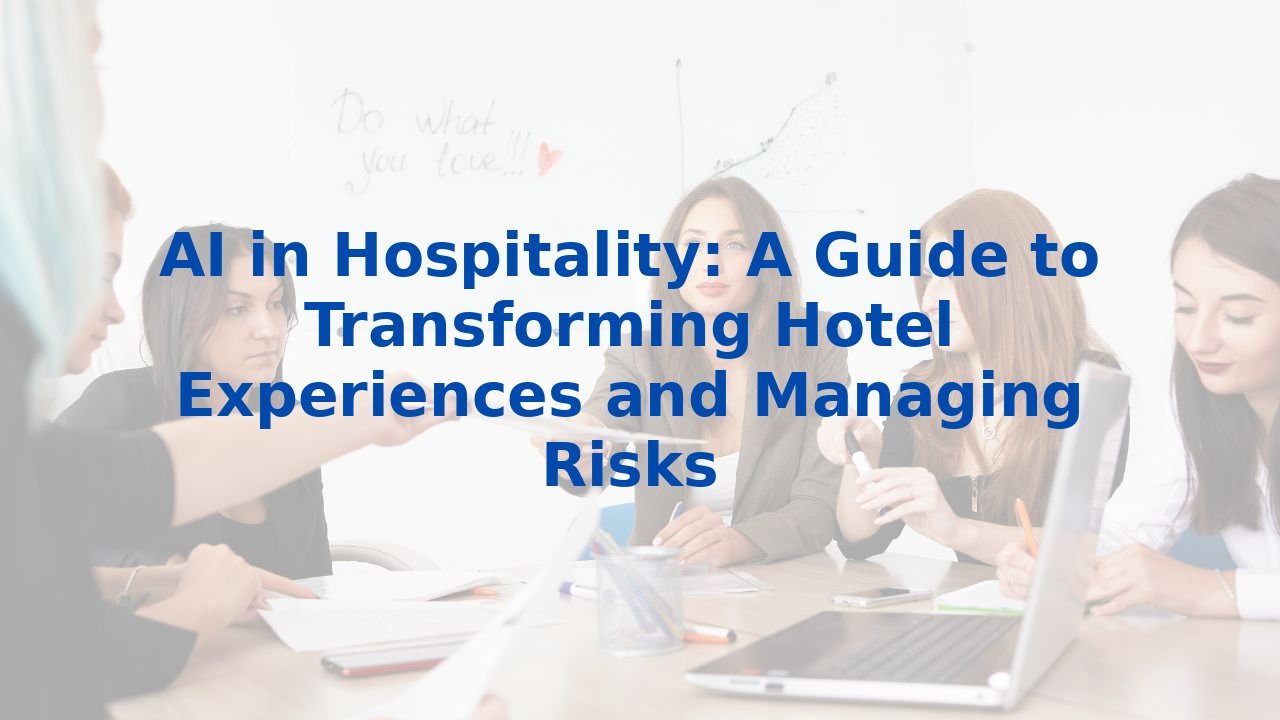AI in Hospitality: A Guide to Transforming Hotel Experiences and Managing Risks
AI in Hospitality: A Guide to Transforming Hotel Experiences and Managing Risks
In a world where customer expectations are continually rising, the hospitality industry is at a crossroads. To stay competitive, hotels must adopt innovative technologies that not only enhance the guest experience but also manage operational risks. Enter artificial intelligence (AI)—a game-changer poised to redefine how hotels do business.
Understanding the Role of AI in Hospitality
AI is not just a trending topic; it's a crucial tool for operational efficiency in the hospitality sector. By automating various business processes, hotels can reduce costs, increase productivity, and create memorable experiences for guests. From reservation management to customer service, AI solutions can seamlessly integrate into existing systems, allowing employees to focus on what truly matters—providing exceptional service.
Enhancing the Guest Experience
Imagine a world where guests can easily book rooms, manage their reservations, and seek assistance from a virtual concierge—all in real time. AI can facilitate this level of convenience through chatbots and virtual assistants that operate 24/7. This means that guests can have their queries resolved without waiting in line or navigating complex menus.
Moreover, AI can analyze data from customer interactions to generate personalized recommendations tailored to individual preferences. This kind of customization not only makes guests feel valued but also encourages repeat visits. Hotels that harness AI for personalization are likely to see significant boosts in customer loyalty and satisfaction.
Streamlining Operations
Operational challenges often plague the hospitality industry, from staffing shortages to inefficient resource allocation. AI can address these issues by predicting demand trends and optimizing staffing schedules. By accurately forecasting peak check-in/check-out times, hotels can ensure they have the right number of staff on hand, thereby reducing wait times and enhancing service delivery.
Furthermore, AI-powered analytics tools can assist in inventory management, ensuring that hotels maintain optimal stock levels and reduce waste. This not only saves money but also contributes to sustainability initiatives—an increasingly important aspect for today’s environmentally conscious travelers.
Risk Management Through Predictive Analytics
In an industry that is often unpredictable, managing risks effectively is paramount. AI can help hospitality businesses identify potential risks through predictive analytics. For example, by analyzing historical booking data and trends, AI systems can recognize patterns that indicate potential cancellations or no-shows. Armed with this knowledge, hotels can take pro-active measures, such as adjusting pricing or implementing promotions to attract last-minute bookings.
Moreover, AI can also enhance security measures within hotels. By utilizing facial recognition systems, hotels can not only streamline the check-in process but also enhance safety protocols, ensuring that only authorized guests gain access to specific areas of the property. This dual benefit of improving efficiency while enhancing security is an incredible advantage for any establishment.
The Importance of Training Employees for AI
While the benefits of AI in hospitality are substantial, the technology is only as effective as the people utilizing it. Training employees to understand and engage with AI tools is vital for maximizing their potential. Individuals equipped with AI skills are better prepared to leverage data insights and deploy AI solutions effectively within their roles.
Investing in employee training can enhance job satisfaction and morale, leading to a more engaged workforce. Not only do staff members become valuable assets in implementing AI strategies, but they also contribute to a culture of innovation and continuous improvement. This ultimately aligns with the overarching goal of delivering unparalleled guest experiences.
Conclusion: Embracing AI for a Brighter Future
The integration of AI within the hospitality sector is no longer a luxury—it's rapidly becoming a necessity. By enhancing guest experiences, streamlining operations, and mitigating risks, AI is poised to transform how hotels function. The journey won’t be without its challenges, but the rewards are immense for those who are willing to adapt and evolve.
As we navigate this technological landscape, it’s paramount for hospitality businesses to invest in not just the tools themselves but also in training their workforce to harness these innovations effectively. Embracing AI means stepping into a future filled with possibilities—why not take that leap today?
If you're interested in understanding more about integrating AI into your hospitality business or exploring comprehensive training options for your team, visit us here.



